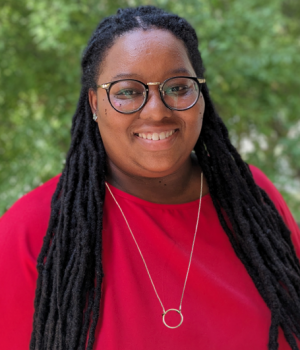Meet Rosalind Evans, Clinical Assistant Professor, Department of Social Work 
Why did you choose to study social work?
I was drawn to social work soon after I learned about the field’s history and impact in a psychology course at my community college. I was interested in advocating and providing support to children and families of vulnerable and oppressed populations so there was a natural alignment of values. Through courses on human behavior and development and social justice, I was able to see how a social work degree could provide me with an education to combat inequality in systems and institutions and become a change agent.
What do you enjoy most about teaching?
Teaching allows me to connect with students and learn about their educational and career goals and dreams. I enjoy having the opportunity to support them throughout their academic journey. Through my teaching, I am able to instill knowledge that will guide them in future practice. In my courses, I intentionally incorporate topics to equip students with skills like self-awareness that allow them to identify their strengths as well as tap into techniques that can help them focus on their health and wellness. These skills can support them, especially as they navigate the early years of their careers, and assist in preventing potential burnout or compassion fatigue.
What do you hope your students gain from your courses?
I hope students gain two things when they leave my classroom: A greater awareness of the course material that can aid them in their future careers and a passion for client advocacy. I tell social work students that they are practicing with a diverse range of clients that can include individuals, families, groups, communities, or even organizations. Social work is a field that assists people in an ever-changing society, which means social workers have to be lifelong learners who are informed of how these changes can impact their clients and the systems the clients engage with. In addition, social workers practice from an evidence-based approach. Therefore, in my courses, I discuss the importance of research and being knowledgeable of updated policies and practices that can guide their work with clients.
What did you do before pursuing a career in academia, and why did you decide to pursue teaching instead?
Prior to my career in academia, I served as a mentor to youth at risk in Oklahoma. I would visit middle schools, high schools, and alternative high schools to facilitate groups with those in our program, share resources, and be a pillar of support. The program focused on teaching them skills that would aid in their growth and development such as emotional awareness, how to identify their strengths, and ways they could work towards achieving their goals. While I truly enjoyed working in this role, I aspired to further my education and pursue a doctorate to expand my knowledge base and sharpen my skills to conduct research - with the ultimate goal being to then share that expertise with others.
When you’re not teaching, what do you enjoy doing?
When I am not teaching, I prioritize spending time with my loved ones. I enjoy exploring new cafes for boba tea, namjooning, playing video games, and catching up on my favorite anime shows. I can also be found with my head buried in a new book or working on research.
Do you have any fun facts that others may not know about you?
I love traveling! I have visited 23 U.S. states, 1 U.S. Territory, and 4 different countries.

